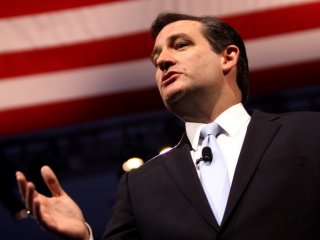Ted Cruz, Establishment Man?
The GOP establishment's best anti-Trump chance is now the senator from Texas, not the one from Florida.
It came as no surprise that Donald Trump pummeled the competition on Super Tuesday, winning a broad cross-section of states: Georgia, Virginia, Massachusetts, Alabama, Arkansas, Vermont, Tennessee. When he emerged under the sparkling chandelier at his estate in Palm Beach, it both looked and felt like a coronation. Trump might not yet be inevitable, but the official GOP playbook lies in tatters.
The Republican establishment’s strategy was apparently formed around the notion that Marco Rubio himself is a superdelegate worth 800 regular delegates. That’s really all they’ve got at this point. Their man has only won in Minnesota, a quirky caucus state that was barely contested by the other candidates. (“As go the Minnesota caucuses, so go the nation,” quipped David Axelrod on CNN.) Meanwhile, Rubio is on track to score less than 20 percent of the vote in lucrative Texas, which means he won’t qualify for a single delegate there.
Rubio’s problem is that he’s confused electoral success with the lesser metric for victory we pundits like to use: the news cycle, several of which Rubio won last week thanks to his newfound feistiness against Donald Trump. But Politico headlines don’t translate into delegates. “Winning a state outright would be nice in that it would shut the pundits up,” conceded Team Rubio last night. Actually, winning a state outright would be nice because it gets you delegates.
For all the chatter about how Trump is snatching evangelicals from Ted Cruz, he’s also overshadowing what should be Rubio’s power bases in urban centers and the North. Deep-blue states like Massachusetts were easily conquered by Trump; in fact, nearly 20,000 Bay Staters unregistered with the Democratic Party ahead of Super Tuesday, presumably so they could pull the lever for The Donald. Redistribute to Rubio every John Kasich voter in Massachusetts, and he still doesn’t come close to first place. Even in Rubio’s delegate-hefty, winner-take-all home state of Florida, polls indicate he’ll lose decisively. If Rubio can’t bask in the Sunshine State and New England, where can he? About the only place he performed well last night was among his most passionate supporters: the defense contractors of Northern Virginia.
Ted Cruz, on the other hand, has proven he has some juice against Trump, adding wins in Texas, Oklahoma and Alaska to his initial Iowa victory. Cruz had won 226 delegates to Rubio’s 106. The GOP wants their anti-Trump candidate? They’ve got him. Their best (if still remote) chance is for Rubio to drop out, endorse Cruz, and allow the Texas senator to consolidate wins in the South and West to counter Trump’s Northern strongholds. They’ll have to do it quickly. Kentucky and Louisiana both hold their contests this Saturday, and while primaries and caucuses over the next month span the country, the lethal week of April 19-26 will see six Northeastern states head to the polls, a certain romp for Trump. If Cruz doesn’t have a strong share of delegates by then, his quest for the presidency will end.
Unfortunately for him, that may be the desired outcome of many in the Republican establishment. Elites like Bob Dole and John Feehery have already signaled their preference for Trump over Cruz because they believe the former to be pliable and the latter to be an intractable blowhard. Rubio might have been all but eliminated last night, but many Washington Republicans would sooner commit hari-kari than form ranks behind his fellow Cuban.
Matt Purple is the deputy editor of Rare Politics.
Image: Flickr/Gage Skidmore.

